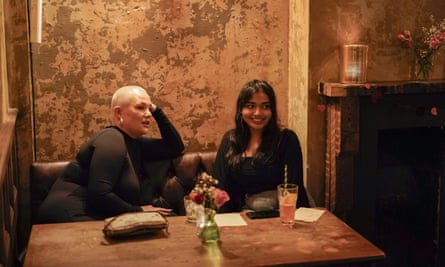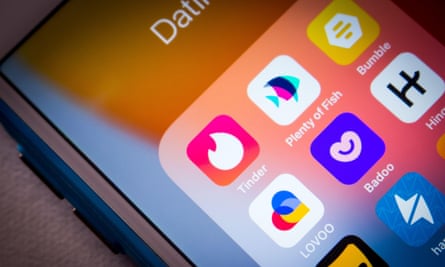
For centuries, our romantic fates were thought to be written in the stars. Wealthy families would even pay fortunes to have a matchmaker foretell the success or failure of a potential marriage.
Despite the lack of any good evidence for its accuracy, astrology still thrives in many lifestyle magazines, while the more sceptical among us might hope to be guided by the algorithms of websites and dating apps.
But are these programs any more rigorous than the signs of the zodiac? Or should we put our faith in love languages and attachment theory? (That’s to name just two fashions in pop psychology.)
The world of matchmaking is riddled with myths and misunderstandings that recent science is just starting to unravel. From the inevitably messy data, a few clear conclusions are emerging that can help guide us in our search for love.
If you are looking for the secrets of romantic success, the most obvious place to start would seem to be the science of personality. If you are an outgoing party animal, you might hope to find someone with a similar level of extraversion; if you are organised and conscientious, you might expect to feel a stronger connection with someone who enjoys keeping a rigid schedule.
The scientific research does offer some support for the intuitive notion that “like attracts like”, but in the grand scheme of things, the similarity of personality profiles is relatively unimportant.
“Yes, it is true that people are more likely to experience chemistry with someone who is similar to them in certain ways,” explains Prof Harry Reis at the University of Rochester, New York. “But if I brought you in a room with 20 people who are similar to you in various ways, the odds that you’re going to have chemistry with more than one of them are not very good.” It is only the extreme differences, Reis says, that will matter in your first meetings. “It’s not likely that you would have chemistry with somebody who is very dissimilar to you.”
The rest is just noise. The same goes for shared interests. “The effects are so tiny,” says Prof Paul Eastwick at the University of California, Davis.
Eastwick found similarly disappointing results when he looked at people’s “romantic ideals” – our preconceived notions of the particular qualities we would want in our dream partner. I might say that I value kindness above all other qualities, for instance, and you might say you are looking for someone who is adventurous and free-spirited.
You’d think we’d know what we want – but the research suggests otherwise. While it’s true that certain qualities, such as kindness or adventurousness, are generally considered to be attractive, experiments on speed-daters suggest that people’s particular preferences tend to matter very little in their face-to-face interactions. Someone who stated that they were looking for kindness, for example, would be just as likely to click with someone who scored high on adventurousness – and vice versa. Despite our preconceptions, we seem open to a wide variety of people showing generally positive attributes.
“We can’t find evidence that some people really weigh some traits over others,” Eastwick says. He compares it to going out to a restaurant, ordering a specific dinner, then swapping food with the table next to yours. You’re just as likely to enjoy the random dish as the one you’d originally ordered.
Given this growing body of research, Eastwick is generally very sceptical that computer algorithms can accurately match people for chemistry or compatibility. Working with Prof Samantha Joel at Western University in Canada, he has used a machine learning program to identify any combinations of traits that would predict mutual attraction.
Each participant completed a 30-minute survey, with detailed questions about their personality traits, their physical attractiveness, their political and social values and their dating preferences (whether they were looking for a fling or a long-term relationship). “It was very much a ‘kitchen-sink’ approach,” says Eastwick. The researchers then put the participants on blind dates and questioned them about whether they were likely to hook up afterwards.

Pubgoers at a speed-dating event in 2021. Experts find that we bin our romantic ideals at such gatherings. Photograph: Alberto Pezzali/AP
Surprise, surprise? The algorithm could accurately pick out the participants who were generally considered to be more attractive to a larger number of people. And it could pick out those who were generally less picky and more open to second dates with a larger number of people. On predicting the particular level of attraction between two specific people, however, it performed no better than chance. There was no magic formula that could ensure a sizzling first date.
Most dating apps and websites keep the details of their algorithms secret, but Eastwick thinks it is unlikely that these companies have stumbled upon some secret that is missing from the psychological literature. Indeed, he suspects that romantic attraction may be an inherently “chaotic” process that inherently defies accurate prediction.
Reis is similarly downbeat about the chances of algorithms correctly predicting the prick of Cupid’s arrow. “The evidence that they have is very, very low-quality work.” In his opinion, these apps may rule out the people with the most extreme differences in personality and interest – but beyond that, it’s largely chance.
According to psychological research, we are much more likely to be swayed by the flow of the conversation and people’s nonverbal cues. “It’s whether the other person is smiling at the right moments, whether they’re really listening and showing that they understand what you’re saying,” says Reis. That’s impossible to gauge before the encounter from data gathered in a survey.
An additional problem is that the questions on a survey are necessarily rather abstract; they can’t capture the tiny details of someone’s life that might promote bonding. You might not bond over a general love of travel, but your mutual love of a particular location that you just happen to mention in your conversation. You might even start out with differences, but then change your mind on a certain topic as your date persuades you to see things their way – a process of reaching a joint understanding could provide the point of connection. “No algorithm is going to be able to tell us that’s going to happen ahead of time,” says Eastwick.
Even after couples have started dating, it can be tricky to work out which relationships will last in the long term. Analysing data from more than 11,000, Eastwick and Joel found that someone’s perception of their partner’s commitment was far more important than particular personality traits in determining their satisfaction in the relationship.
If you are au fait with self-help literature, you might have come to believe that “attachment styles” might explain your relationship woes. These are supposed to describe different ways of forming relationships with others, based on someone’s childhood experiences with their caregivers. The terms are fairly self-explanatory – you can have “secure”, “avoidant” or “anxious” attachment styles. You will find articles arguing that someone who has an anxious attachment style may find that an avoidant partner only exacerbates their insecurities.
Eastwick and Joel’s data suggest that attachment styles do play some role in people’s relationship quality. Even so, we must be careful not to overexaggerate their influence on our romantic fates. Prof Pascal Vrtička, a social scientist at the University of Essex, points out that our attachment styles can change with time. With the right partner, someone might move from anxious to secure, for instance. “It might take some time to lose some of your insecurity, but it is possible.” Once again, our attachment styles are one factor in a dynamic process, rather than determining the health of our relationships from the very beginning.
Surprise, surprise? The algorithm could accurately pick out the participants who were generally considered to be more attractive to a larger number of people. And it could pick out those who were generally less picky and more open to second dates with a larger number of people. On predicting the particular level of attraction between two specific people, however, it performed no better than chance. There was no magic formula that could ensure a sizzling first date.
Most dating apps and websites keep the details of their algorithms secret, but Eastwick thinks it is unlikely that these companies have stumbled upon some secret that is missing from the psychological literature. Indeed, he suspects that romantic attraction may be an inherently “chaotic” process that inherently defies accurate prediction.
Reis is similarly downbeat about the chances of algorithms correctly predicting the prick of Cupid’s arrow. “The evidence that they have is very, very low-quality work.” In his opinion, these apps may rule out the people with the most extreme differences in personality and interest – but beyond that, it’s largely chance.
According to psychological research, we are much more likely to be swayed by the flow of the conversation and people’s nonverbal cues. “It’s whether the other person is smiling at the right moments, whether they’re really listening and showing that they understand what you’re saying,” says Reis. That’s impossible to gauge before the encounter from data gathered in a survey.
An additional problem is that the questions on a survey are necessarily rather abstract; they can’t capture the tiny details of someone’s life that might promote bonding. You might not bond over a general love of travel, but your mutual love of a particular location that you just happen to mention in your conversation. You might even start out with differences, but then change your mind on a certain topic as your date persuades you to see things their way – a process of reaching a joint understanding could provide the point of connection. “No algorithm is going to be able to tell us that’s going to happen ahead of time,” says Eastwick.
Even after couples have started dating, it can be tricky to work out which relationships will last in the long term. Analysing data from more than 11,000, Eastwick and Joel found that someone’s perception of their partner’s commitment was far more important than particular personality traits in determining their satisfaction in the relationship.
If you are au fait with self-help literature, you might have come to believe that “attachment styles” might explain your relationship woes. These are supposed to describe different ways of forming relationships with others, based on someone’s childhood experiences with their caregivers. The terms are fairly self-explanatory – you can have “secure”, “avoidant” or “anxious” attachment styles. You will find articles arguing that someone who has an anxious attachment style may find that an avoidant partner only exacerbates their insecurities.
Eastwick and Joel’s data suggest that attachment styles do play some role in people’s relationship quality. Even so, we must be careful not to overexaggerate their influence on our romantic fates. Prof Pascal Vrtička, a social scientist at the University of Essex, points out that our attachment styles can change with time. With the right partner, someone might move from anxious to secure, for instance. “It might take some time to lose some of your insecurity, but it is possible.” Once again, our attachment styles are one factor in a dynamic process, rather than determining the health of our relationships from the very beginning.

Evidence suggests that dating app algorithms produce rudimentary matches. Photograph: Koshiro K/Alamy
The same can be said of “love languages”. While people’s style of expressing affection and appreciation for their partner – whether we prefer praise, or gifts, or hugs and kisses to show our affection – can influence a couple’s initial compatibility, it is possible to adapt and change over time.
Ultimately, our beliefs about relationships and the ways they ought to progress may be just as important as the initial compatibility of any two people. Our love lives, like so many areas of health and wellbeing, are the subject of expectation effects.
To get a flavour of this research, consider the following statements:
Potential relationship partners are either compatible or they are not
Relationships that do not start off well inevitably fail
And
The ideal relationship develops gradually over time
A successful relationship evolves through hard work and the resolution of incompatibilities
People who endorse the first two statements are said to have a “romantic destiny” mindset, while those who endorse the last two statements are said to have a “romantic growth” mindset. (Some people will fall in between – they might believe that relationships need to start out well, but that they can also develop over time.)
In general, people with the romantic destiny mindset will place more importance on the initial chemistry of the first encounter and if that goes well, they may be quick to fall in love. But they do not cope well with disagreements and may lose interest as potential incompatibilities come to light and may even engage in toxic behaviours to extricate themselves. Recent research suggests that people with the destiny mindset are more likely to “ghost” partners, for example. Those with the romantic growth mindset, on the other hand, tend to work harder to cope with the challenges, rather than looking to start again whenever differences come to light.
That’s the romantic side. Prof Jessica Maxwell, a social psychologist at McMaster University in Ontario, Canada, and colleagues have found similar patterns of behaviour in the bedroom. People with a “sexual destiny mindset” endorse statements such as:
If sexual partners are meant to be together, sex will be easy and wonderful
It is clear right from the start how satisfying a couple’s sex life will be over the course of their relationship
Maxwell’s studies show that people with these kinds of beliefs can fare very well, but they tend to be fatalistic if issues emerge. People with a sexual growth mindset, however, are more proactive about navigating their disappointments and looking for ways to improve their own and their partner’s satisfaction.
The same can be said of “love languages”. While people’s style of expressing affection and appreciation for their partner – whether we prefer praise, or gifts, or hugs and kisses to show our affection – can influence a couple’s initial compatibility, it is possible to adapt and change over time.
Ultimately, our beliefs about relationships and the ways they ought to progress may be just as important as the initial compatibility of any two people. Our love lives, like so many areas of health and wellbeing, are the subject of expectation effects.
To get a flavour of this research, consider the following statements:
Potential relationship partners are either compatible or they are not
Relationships that do not start off well inevitably fail
And
The ideal relationship develops gradually over time
A successful relationship evolves through hard work and the resolution of incompatibilities
People who endorse the first two statements are said to have a “romantic destiny” mindset, while those who endorse the last two statements are said to have a “romantic growth” mindset. (Some people will fall in between – they might believe that relationships need to start out well, but that they can also develop over time.)
In general, people with the romantic destiny mindset will place more importance on the initial chemistry of the first encounter and if that goes well, they may be quick to fall in love. But they do not cope well with disagreements and may lose interest as potential incompatibilities come to light and may even engage in toxic behaviours to extricate themselves. Recent research suggests that people with the destiny mindset are more likely to “ghost” partners, for example. Those with the romantic growth mindset, on the other hand, tend to work harder to cope with the challenges, rather than looking to start again whenever differences come to light.
That’s the romantic side. Prof Jessica Maxwell, a social psychologist at McMaster University in Ontario, Canada, and colleagues have found similar patterns of behaviour in the bedroom. People with a “sexual destiny mindset” endorse statements such as:
If sexual partners are meant to be together, sex will be easy and wonderful
It is clear right from the start how satisfying a couple’s sex life will be over the course of their relationship
Maxwell’s studies show that people with these kinds of beliefs can fare very well, but they tend to be fatalistic if issues emerge. People with a sexual growth mindset, however, are more proactive about navigating their disappointments and looking for ways to improve their own and their partner’s satisfaction.

Research shows that shared interests only give a minor boost to romantic chemistry. Photograph: Dmytro Sidelnikov/Alamy
Some relationships, however, are best left on the scrapheap; even those with a growth mindset need to acknowledge when things simply aren’t going to work out. And if there is no chemistry on a first date, there is no need to put yourself through another excruciating encounter.
But we should also be wary of having too many fixed preconceptions. Whether you are focused on finding someone with a particular profession, personality profile or planetary alignment, overly rigid ideas can blind you to the potential in the people around you.
If the science tells us anything, it is that love is inherently unpredictable. In matters of the heart, we should always be prepared to be surprised.
Some relationships, however, are best left on the scrapheap; even those with a growth mindset need to acknowledge when things simply aren’t going to work out. And if there is no chemistry on a first date, there is no need to put yourself through another excruciating encounter.
But we should also be wary of having too many fixed preconceptions. Whether you are focused on finding someone with a particular profession, personality profile or planetary alignment, overly rigid ideas can blind you to the potential in the people around you.
If the science tells us anything, it is that love is inherently unpredictable. In matters of the heart, we should always be prepared to be surprised.